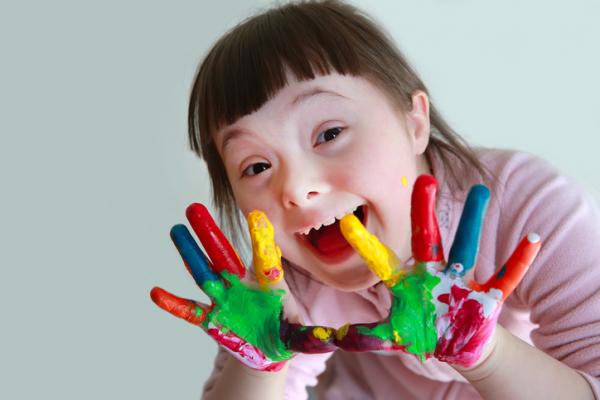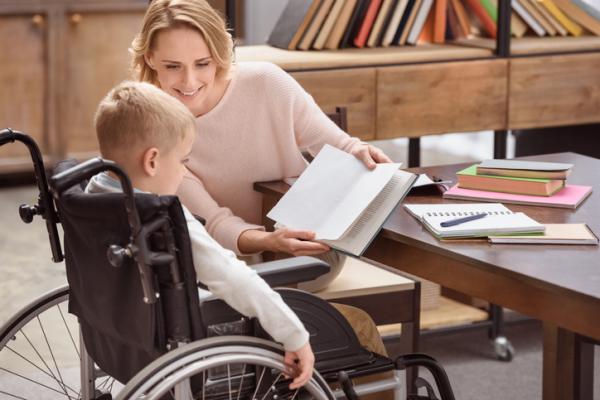Find out if you could be a foster carer
In a few simple questions, you’ll know if you’re suitable to apply to become a foster carer.
Caring for a child with physical disabilities, medical conditions or learning difficulties can be hugely rewarding role. You’ll be helping a child with complex needs live life to the fullest – giving them the help and support they need to reach their potential.
Taking care of a child with disabilities can seem quite daunting, and you will face a variety of challenges. But don’t worry, fostering with NFA opens access to a great range of training and support options.
Whatever your previous experience of caring for children, there’s no reason why you shouldn’t be able to give a secure and stable home to a child with disabilities. To give you an idea of what it’s like to foster a child with disabilities, we’ve put together this comprehensive guide, which includes tips, advice and helpful insights from one of our current foster carers.

Whether you have children of your own or have previous fostering experience, caring for children with complex needs and disabilities is a specialist type of foster care that promises a challenging new chapter in your fostering journey.
As a carer for disabled children, you will be taking care of young people with a range of difficulties and medical conditions, ranging from developmental disabilities like autism to physical disabilities which limit a child’s mobility. You’ll have to be patient, open-minded, and committed to offering the level of specialist care these children.
Caring for children with disabilities is one of the most challenging roles in foster care, but it’s also incredibly rewarding. Your help, support and care will have a positive impact on some of the most vulnerable young people in society – giving them the best possible opportunity to live a happy life.
Of course, we don’t expect you to take care of a disabled child on your own without any help or support. If you choose to foster a disabled child with the NFA, you’ll receive ongoing practical training and contact with a great support network.

Before you make the first step towards disabled foster care, there are several things you need to consider about the challenges ahead.
Caring for children with complex needs requires a great deal of time and commitment, so you may not be able to maintain a part-time job whilst offering the right level of care a child needs. If you already have children of your own, you also need to think about the demands that raising a disabled child could place on your family.
Depending on how much time you’re able to dedicate to caring for a child, there are several different types of disabled fostering available, including full-time, short-term and respite care. Full-time fostering requires the biggest commitment, while short-term is perfect for those who want to foster a disabled child on a more temporary basis.
Respite care is slightly different in that it’s an ‘as-and-when’ form of fostering, designed to give birth parents or full-time foster carers a break from the unique challenges of raising a child with disabilities. It’s a really beneficial and worthwhile thing to do, giving full-time carers a break when they need it.
Whichever type of disabled foster care you choose, you’ll receive the same level of help, training and support from the NFA – giving you the skills and knowledge to offer a safe and stable home to a child in need.
Foster care is about community, and that’s why we think our current carers are some of the best people to go to for help and advice about fostering a child. To help you decide whether disability foster care is right for you, we recently spoke with Carole, a foster carer with extensive experience in looking after children with complex needs.
Hi Carole, thanks for agreeing to talk to us about your experience of fostering. In your experience, how does fostering children with disabilities differ from caring for young people who don’t have physical or learning difficulties?
When you care for a child with disabilities, it can be very tiring and challenging, but there is also a lot of pleasure when they reach a milestone. The nature of their condition often means there’s a lot of involvement from professionals, as well as regular hospital appointments and training sessions. This can continue for the whole time you are caring for the child or it can just be for the initial period. Either way, you gradually settle into a fairly easy routine, and know that you have support available if you need it.
What would you say is the most challenging aspect of fostering young people with disabilities?
It can involve a lot of training before the child comes to you, and it can also feel like it takes over your whole life until you get into a routine. It’s a really big commitment, but it does come with plenty of rewards.
Caring for children with complex needs requires lots of training and support. Could you tell us about the different training courses you’ve undertaken since becoming a foster carer?
I have done Portage training, sign language, Autism and ADHD, Gastrostomy Feeding and Central Line PN feeding and care. It’s great to gain practical skills and feel like you’re making a genuine difference to a child when they come into your care.
What traits would you say are essential for anyone wishing to foster children with disabilities?
You have to be prepared to listen to advice but also ask for help if you need it. Give unconditional love as the child may not always be able to show it to you. Patience and understanding are also key, as they may not always understand what they are doing, who you are or the context of your relationship.
What kind of help and support do you find most useful when caring for children with disabilities?
You need a good network of friends and family who share your patience, understanding and empathetic nature. Your SSW (social support worker) will also become a vital lifeline, while having a good rapport with different medical professionals can help build confidence and understanding around your child’s condition.
Did you have any fears and anxieties about caring for children with disabilities? And, if so, what helped to alleviate these?
You will always have fears and anxieties when you first take in a child with disabilities as it can feel like stepping into the unknown. As your confidence grows, these worries will gradually fade, but always feel that you can talk to your SSW and also any professionals that are dealing with the child.
What would you say is the most rewarding aspect of caring for children with disabilities?
There is so much that is rewarding. When you see them do something that you may have been helping them to learn for a long time. It can be them just giving you a smile when they are pleased that they have achieved something, no matter how small it may seem.
Do you have any other input and advice for those who may be concerned about fostering children with disabilities?
All I can say is that, while you may have concerns about the challenges of taking care of a child with disabilities, you can get so much pleasure and happiness caring for these children with the right guidance and support.
Do you think you have what it takes to foster children with disabilities? Why not enquire online today to speak to a member of the National Fostering Group?
Alternatively, if you would like some more information on the different types of foster care, you can browse our website.